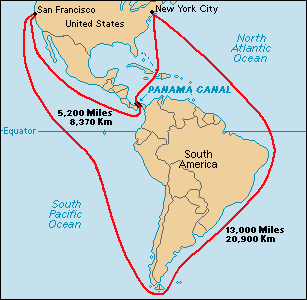Indebted Spanish Consortium Threatens to Stop Panama Canal Expansion Unless it is Paid an Extra $1.6 Billion

Sacyr, the Spanish construction giant, hasthreatened to halt work on the expansion of the Panama canal unless it is paid an extra $1.6 billion. The company leads a consortium that won the 2009 contract after bidding to do the job for $1.1 billion less than the next bidder.
Grupo Unidos por el Canal (GUPC) is composed of Impregilo Group of Italy, the Jan De Nul Group of Belgium and Constructora Urbana of Panama in addition to Sacyr Vallehermoso of Madrid. The companies promised to finish the work of building new, wider locks that will allow the 46 mile (77 kilometre) long canal by October 2014 at a price tag of $3.1 billion.
The canal which connects the Atlantic ocean to the Pacific ocean has been a major shipping passage since it was officially opened 100 years ago, allowing ships to cut their voyages by 7,800 miles (12,600 kilometres). It was managed by the United States until 1977 when President Jimmy Carter handed control back to the Panamanians.
U.S. government officials predicted that the companies would bump up the price down the road, according to a June 30, 2009, diplomatic cable released by Wikileaks. “It is widely expected that during construction Sacyr will attempt to renegotiate the price with the ACP [the canal authority],” wrote embassy officials in a memo signed by Barbara Stephenson, then U.S. ambassador to Panama.
U.S. officials backed a rival bid by Bechtel of San Francisco. (Bechtel has often had it own problems with cost over-runs such as the infamous Big Dig in Boston where the company’sinitial bid of $2.5 billion eventually hit $14.6 billion)
Sacyr, which has been hard hit by the EuroZone crisis, http://www.corpwatch.org/article.php?id=15889 notably in 2008 when its debt of $16.5 billion was seven times greater than total the value of the company shares at the time. In addition to taking on risky housing construction projects during the boom years, the company also invested heavily in road privatization which also failed to take off.
The Panama contract, which was backed by a guarantee from the Spanish government, was widely seen as a the best opportunity for the struggling company to survive.
In recent months Panamanian government officials have objected to the low quality of the cement that the consortium has been using for the construction. Sacyr has used this complaint to justify an increase in the contract price – stating that it will stop work on January 20 unless their demands are met.
The canal authority has refused. ” The notice of intent to suspend work is not valid and the arguments raised by the contractor in the note lack legal basis and are not clear,” officials said in a statement.
This morning Ana Pastor, Spain’s public works minister, met with Ricardo Martinelli, the Panamanian president to mediate between the company and canal officials to salvage the contract. “They’re going to sit down and talk and have dialogue to try and resolve all the problems,” she told reporters.
Sacyr – which still owes lenders three times more money than the company’s shares are worth – is banking on completing the contract which contributed a quarter of company’s international sales last year.

